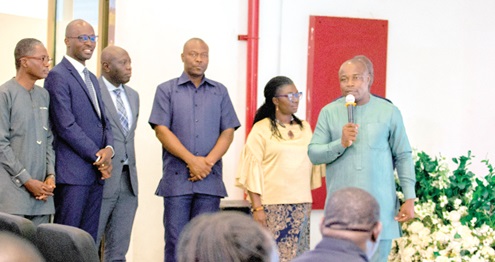The Vice-Chancellor of the University of Professional Studies, Accra (UPSA), Professor John Kwaku Mensah Mawutor, has urged academic institutions to author their own textbooks, not only to promote national culture, but also intellectual independence.
“For too long, our classrooms have relied heavily on foreign-authored textbooks, some of which, while excellent, are more relevant to contexts in New York or London than to Accra, Tamale or Takoradi.
“They reference businesses our students have never interacted with. They overlook the richness of Ghana’s economy, its legal structures, social systems, and cultural nuances. In short, they tell stories, but not our stories,” he added.
The V-C described such an initiative as a statement of intellectual sovereignty, cultural pride and academic maturity.
Event
Prof. Mawutor was speaking at the launch of a Faculty-Authored Textbook Project and Faculty Journals in Accra.
The project will involve faculty members authoring textbooks in which they would incorporate national business case studies, and create faculty journals focused on specific areas of specialisation.
The project also seeks to build the capacity of faculty members to develop course-specific materials in which content would address core topics with practical examples and sufficient academic rigour.
It will also involve a collection of faculty-based academic journals to enhance scholarship and promote the use of indigenous case studies in teaching.
It forms part of the university’s broader vision to develop locally relevant academic learning materials and reduce the reliance on foreign-authored textbooks.
Importance
Prof. Mawutor underscored the importance of making learning materials more relatable by using examples from local businesses, while expressing concern about the limited availability of locally authored textbooks in university libraries.
He said the project would also encourage lecturers to translate practical business experiences into formal academic literature.
Prof. Mawutor cited Ghanaian businesses such as Kasapreko, and Nkulenu Industries, describing them as shining examples of self-belief and home-grown innovation.
“If we can proudly eat what we grow, build what we use, and sell what we make, why can’t we also learn from indigenous businesses through case studies?” he asked.
Prof. Mawutor further stressed the importance of creating relatable stories that students can see, connect with and visit.
The project, he explained, was UPSA’s response to a long-standing academic gap, adding that it would provide students with textbooks that were as “academically rigorous as they are locally grounded”.
“This is just the beginning. Today, we plant the seed. But it will take all of us — faculty, administrators, editors, students and our partners to nurture it into a thriving ecosystem of local scholarship,” the V-C said.
Policy
A senior lecturer and member of the Faculty-Authored Textbook Project Committee, Dr Eric Boachie Yiadom, also described the initiative as significant, saying it was a key pillar of UPSA’s academic innovation policy.
He explained that the policy was to generate contextually relevant academic resources, reduce the burden of expensive foreign textbooks, and improve the quality of teaching materials.
Dr Yiadom added that the project would also encourage academic authorship among faculty members and increase access to affordable educational materials for students.
“This initiative will not only enhance UPSA’s enviable position as a centre of academic excellence, but also empower students through relatable and accessible learning resources,” he added.

